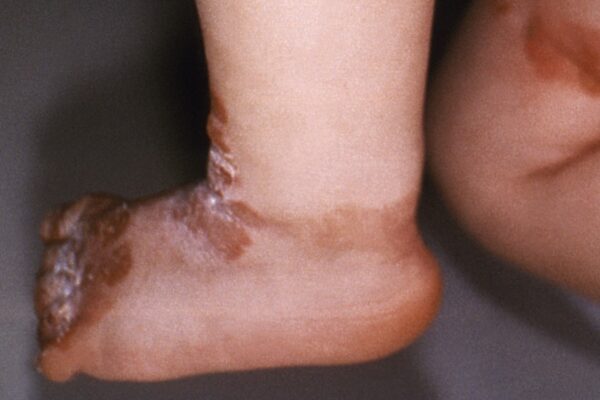
A rare skin disorder that leads to fragile skin susceptible to frequent wounds and blisters now has its first FDA-approved therapy, a topically applied gel that facilitates healing. The Krystal Biotech drug is a gene therapy, and in a first for this treatment modality, dosing can be repeated as needed.
The regulatory decision announced Friday covers the treatment of dystrophic epidermolysis bullosa (DEB) in patients age 6 months or older. The approval spans both the recessive and dominant forms of the genetic disorder. Pittsburgh-based Krystal will market its new product under the brand name Vyjuvek.

Integrating GLP-1s: How Berry Street is Redefining Nutrition Care
Richard Fu details the company's approach to nutrition therapy and strategy for patients using GLP-1s.
“Throughout Vyjuvek’s development, people were asking, can gene therapy really be redosable,” Krystal Chairman and CEO Krish Krishnan said, speaking during a Friday evening conference call. “Will Vyjuvek be able to treat not just recessive but even the dominant form of the disease? Are you limited to small wounds or can you treat larger wounds? Are you able to dose a patient at home? And I’m pleased to say the answer to all of the above questions is a resounding yes. Our dream is to treat this disease comprehensively.”
DEB is an inherited disorder affecting the connective tissue in the skin and nails. It stems from mutations in COL7A1, a gene that encodes COL7, a type of collagen important in strengthening and stabilizing the outer and middle skin layers. Without enough COL7, those layers can separate, making patients susceptible to blisters and wounds. Standard treatment is palliative care for those blisters and wounds. The disease can also lead to an aggressive form of skin cancer.
Vyjuvek is a gene therapy designed to address the mutation at the root of DEB. Like other gene therapies, Vyjuvek reaches its cellular destination carried aboard an engineered virus. Krystal’s therapy employs herpes-simplex virus engineered to eliminate its ability to replicate in normal cells. The virus’s genetic payload is a normal version of the COL7A1 gene, which gets skin cells to produce collagen that forms long and thin fibrils that serve as anchors to hold skin layers together.
The gene therapies that first entered the market are administered as injections or infusions. Those products are one-time treatments because the immune system produces antibodies against the adeno-associated viruses that are the delivery vehicle of choice for carrying the genetic payload. Krystal’s gene therapy stands apart in that it’s formulated as a gel for topical administration. It’s also redosable. The herpes-simplex virus persists in the body and hides from the immune system, a capability that makes a gene therapy delivered with a version of this virus suitable for repeat dosing.
Vyjuvek’s approval is based on two clinical trials, one of them an open-label study and the other one placebo-controlled. In the open label study, results showed durable wound closure, expression of full-length COL7 in the skin, and assembly of the anchoring fibrils. Results from this Phase 1/2 test were published last spring in Nature Medicine.
In the placebo-controlled test, which enrolled 31 patients ranging from 1 to 44 years of age, the participants served as their own controls. Investigators identified two wounds of comparable size on each patient. One wound was randomly selected to be treated with the study drug while the other received a placebo. This study met its main goal of showing complete wound healing at six months. It also met a key secondary goal of showing complete wound healing at three months. The therapy was well tolerated and no drug-related serious adverse events were reported in the clinical trials. The most common adverse reactions were itching, redness, chills, rash, cough, and runny nose. Results were published last December in the New England Journal of Medicine.
Vyjuvek can only be administered by a clinician, but this treatment can happen in a healthcare setting or the patient’s home. The therapy is applied as droplets placed on a patient’s wounds once a week. In a note sent to investors, William Blair analyst Tim Lugo said that approval for treating both recessive and dominant forms of DEB as well as home dosing together represent the best-case outcome for the Vyjuvek’s label. But he added that outstanding question is the market size given the rareness of DEB.
Chief Commercial Officer Andy Orth said Krystal estimates that there are 9,000 DEB patients in reimbursable markets around the world, including about 3,000 in the U.S. The company has set a wholesale price of $24,250 per vial of Vyjuvek. Use of the therapy will vary depending on the severity of the disease in a patient and the surface area of the wounds. Also, use is expected to decrease over time as the therapy lowers a patient’s wound burden. But Orth said that after an initial treatment period, Krystal projects patients will reach a steady state usage of 26 vials per year, bringing the annual cost to $631,500, or $485,000 following mandatory government discounts.
Other companies are pursuing treatments for DEB. Abeona Therapeutics is developing a cell therapy for the recessive form of the disorder. The company expects to submit an application seeking FDA approval later in the current quarter or early in the third quarter of this year. The approach of new biotech startup Telaria is similar to Krystal’s. Launched last year, Telaria is developing a gene therapy that employs an engineered version of the herpes simplex virus. But some DEB research efforts have fallen short. An experimental wound-healing DEB therapy that Amicus Therapeutics acquired failed its pivotal test in 2017.
Vyjuvek will become available in the U.S. in July, Orth said. With the FDA approval, Krystal receives a rare pediatric disease priority review voucher. The company may apply this voucher toward another drug to speed up its regulatory review. But such vouchers have become commodities sold for prices of $100 million or more. Chief Accounting Officer Kate Romano said Krystal had a $355.5 million cash position at the end of March. She added that the company has enough capital to support the company through the end of next year. Krishnan said the company has not yet decided whether to sell the voucher.
Krystal expects to begin the process of seeking European approval for its DEB gene therapy in the second half of this year. Discussions are also ongoing with regulators in Japan. Krishnan said the company believes Vyjuvek could top more than $750 million in annual sales worldwide. But the drug is just the first of what Krystal hopes is several gene therapies—all of them based on the same viral vector technology. The next most advanced program in the Krystal pipeline, KB105, delivers a genetic payload to treat TGM1-deficient autosomal recessive congenital ichthyosis, a rare skin disorder. KB105 is being readied for Phase 2 testing. The company has six additional programs in development. Krishnan said the home dosing and redosability features of Vyjuvek apply to all of them.
“The approval of Vyjuvek finally validates our platform,” he said. “With safety and [chemistry, manufacturing and controls] of our platform clearly established with this approval, we believe the development risk of our pipeline products going forward is mostly limited to clinical efficacy.”
Public domain photo by the CDC








